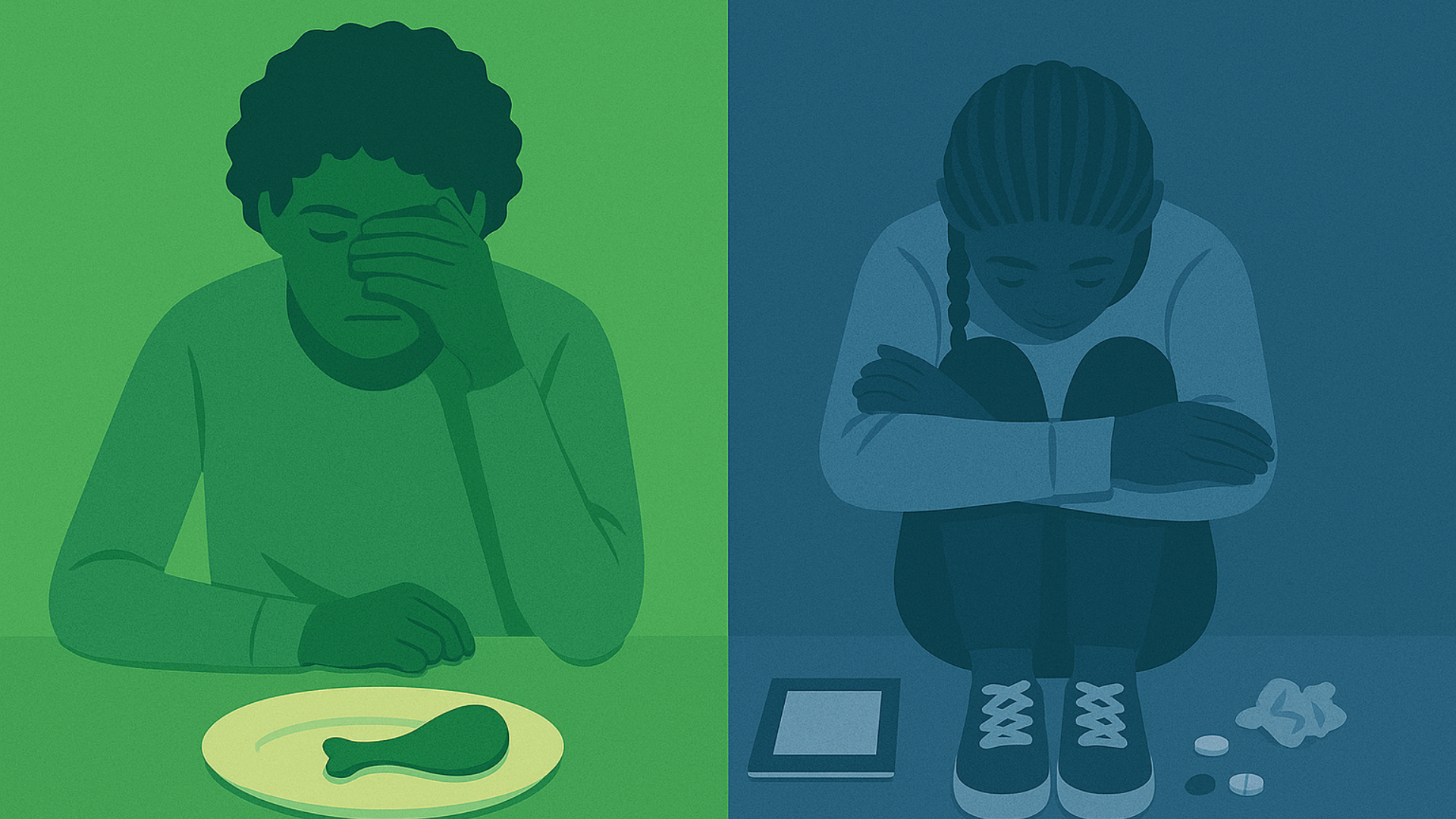Food Sensitivities and Food Allergies: How False Perceptions Can Disrupt Nourishment and Exacerbate Eating Disorders

By Thrive Waco Registered Dietitians Courtney Anderson M.S., RD, LD, CLC, and Sheridan Faye Glaske, M.S., RDN, LD
The diet industry has put its twist on the topic of food allergies in an effort to leverage yet another misleading strategy for unhealthy weight loss, and subsequently encouraging dangerous elimination diets unsupported by clinical evidence. With this latest tactic by diet culture , more and more individuals are misled and mistakenly believe they are food allergic. Research suggests that nearly 19% of U.S. adults believe they have a food allergy, but only 11% percent of U.S. adults are actually diagnosed with one. While food allergies are real and can be dangerous, the implications of eliminating foods from one’s diet without professional guidance can also be detrimental. For individuals struggling with eating disorders , the fad of food allergies can be especially disruptive to their relationship with food, providing them with a fashionable, yet extremely hazardous, excuse to neglect to nourish their bodies.
FOOD ALLERGIES: POTENTIALLY LIFE-THREATENING REACTIONS
A food allergy occurs when the body’s immune system mistakenly attacks a usually harmless protein found in food.
The most common food allergies include:
- Peanuts
- Tree nuts
- Wheat
- Soy
- Eggs
- Milk
- Fish
- Shellfish
Symptoms of food allergies include:
- Hives
- Itching
- Swelling
- Wheezing
- Dizziness
- Trouble breathing and swallowing
Food allergies are serious and if symptoms are severe enough, anaphylaxis can occur, which can be life-threatening.
FOOD SENSITIVITIES: TRENDY, BUT DISRUPTIVE TO NOURISHMENT
As the topic of food allergies has garnered more mainstream attention, the practice of self-diagnosing food sensitivities — a milder food intolerance — has also become popular. While specific foods can in fact cause digestive upset for some, the self-diagnosis of food sensitivities isn’t supported by consistent clinical findings and is not recommended by experts.
In extreme cases, the false perception of food sensitivities may encourage affected individuals to unnecessarily eliminate a wide variety of foods from their diet. When a person experiencing gastrointestinal issues mistakenly attributes their symptoms to a food sensitivity, they may overlook the underlying causes of their digestive struggles. To make matters worse, their limited dietary intake may begin to negatively affect their well-being.
FOOD ALLERGIES, FOOD SENSITIVITIES, AND EATING DISORDERS
For those struggling with eating disorders, falsely believing they have food allergies or food sensitivities can be arguably more dangerous than food allergies themselves.
Individuals with eating disorders commonly experience digestive issues , especially when suffering from malnutrition and starvation .
These uncomfortable gastrointestinal symptoms include:
- Constipation
- Diarrhea
- Bloating
- Acid reflux
- Nausea
Attributing their gastrointestinal symptoms to food allergies or sensitivities may provide them with what they believe to be a simpler and perceivably more socially acceptable explanation. However, this is risky for many reasons. Before exploring any food allergies or sensitivities, a person struggling with an eating disorder should undergo dietary assessment, nutritional rehabilitation, and weight restoration guided by an experienced and multidisciplinary treatment team that takes all aspects of well-being into consideration. Most often, once an individual eats a wide variety of foods adequately and consistently for a sustained period, any digestive symptoms diminish and eventually disappear.
TREATING TRUE FOOD ALLERGIES AND SENSITIVITIES
Using different tests to identify food allergies and their severity, only qualified allergists can accurately diagnose food allergies. Although trendy, at-home tests aren’t effective or accurate ways to identify food allergies and sensitivities.
Treating true food allergies requires individuals to abstain from eating the food to which they’re allergic. However, when this is the case for those with eating disorders, close planning and monitoring by a registered dietitian is necessary to ensure the avoidance doesn’t lead to any nutrient deficiencies.
It’s important to distinguish between a food allergy and a mild sensitivity. For those with sensitivities to foods such as dairy, dietitians often encourage eating small doses of lactose-containing foods. By treating food sensitivities this way, it’s possible to decrease one’s symptoms, prevent complete intolerance, and avoid any unnecessary elimination of nutrients.
FOOD FREEDOM AT THRIVE
Thrive offers integrated eating disorder treatment as well as outpatient nutritional support that emphasizes adequacy, balance, and choice so that individuals can develop a more peaceful, intuitive, and autonomous relationship with food. Reach out to learn more.
About the Authors
Thrive Waco Registered Dietitian Courtney Anderson M.S., RD, LD, CLC
Courtney is a Registered Dietitian Nutritionist and Certified Lactation Counselor passionate about helping clients use food as a tool for health and joyful living. Her practice is built around the marriage of medical nutrition therapy with the principles of Intuitive Eating.
She began studying nutrition science because of her fascination with food and the body. In her practice, she hopes to educate and empower others to harness the awesome benefits of the food around them, and to provide them valuable skills to apply nutrition principles in their everyday life.
By marrying her experience of disordered eating with her knowledge of medical nutrition therapy and her skills as an adjunct lecturer at the university level, she has been able to create a holistic approach to health and wellness for clients that focuses on education and practicing new skills that not only improve her clients’ health but also their relationship with food and body.
Thrive Waco Registered Dietitian Sheridan Faye Glaske, M.S., RDN, LD
With both a bachelor’s degree in exercise physiology and a master’s degree in nutrition sciences from Baylor University, Sheridan Glaske wears her Baylor Bear pride proudly. Throughout her career in health and wellness, she has served as an exercise physiologist, a lifetime fitness adjunct lecturer at Baylor University, and a certified yoga and barre instructor. She recently completed the 1200-hour Wellness Workdays Dietetic Internship program and has joined Thrive Wellness Waco as a registered dietitian. At Thrive, she offers her experience, expertise, and passion for complete well-being to individuals recovering from eating disorders, disordered eating behaviors, and perinatal mental health concerns.
As a former fad-dieter who valued being thin over being healthy and happy, Sheridan struggled with an undiagnosed eating disorder. Her education and experience have taught her that as a society, disordered eating and exercise habits are normalized while the emotional, psychological, and social aspects of health are neglected.
In a world where diet culture is deceiving and dangerous, it can be difficult to determine who to turn to and which resources to trust. Sheridan finds great fulfillment in supporting others through sharing sound advice and evidence-based practices that challenge the unrealistic ideals of diet culture. She advocates for the Health At Every Size (HAES) movement and promotes that one does not need to be a specific size or weight to be healthy. Sheridan wants her clients to know that they are not alone and to believe deep down that they are worthy of receiving support.








